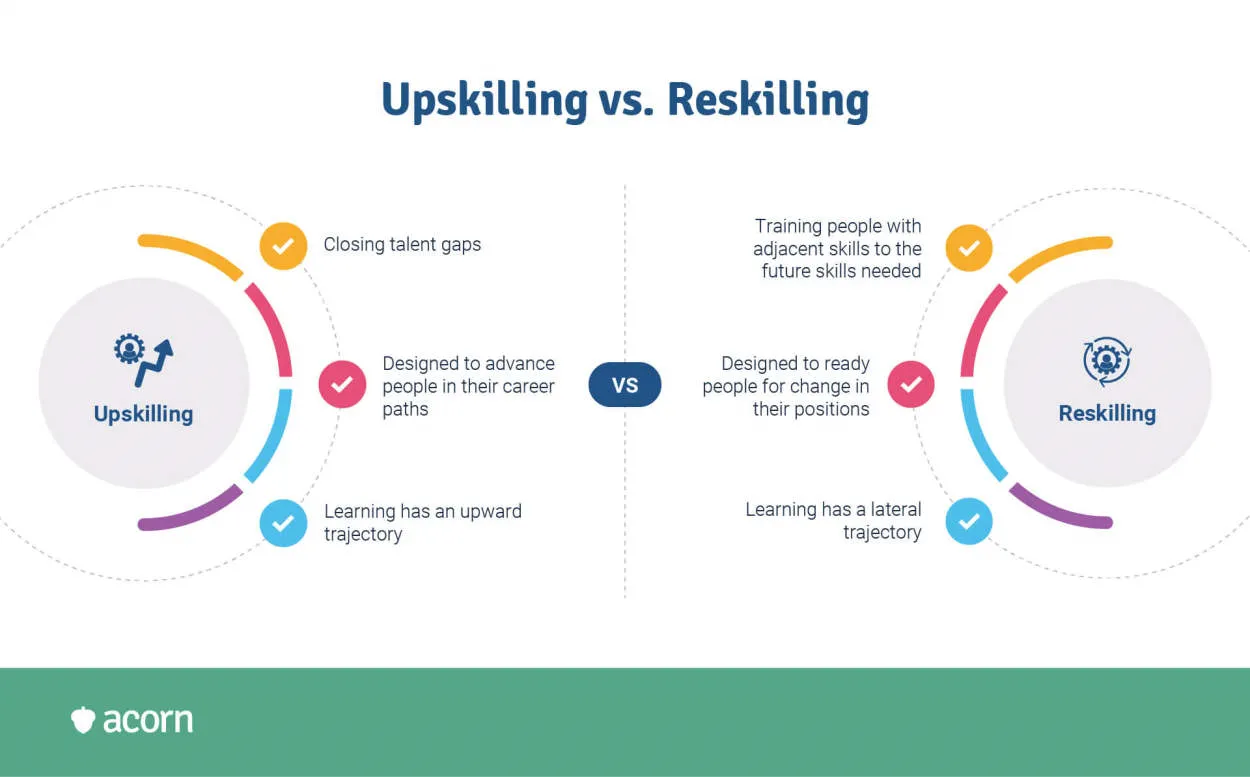In today’s fast-paced and ever-changing job market, the importance of reskilling and upskilling for employees cannot be overstated. With technological advancements and industry disruptions, staying relevant and equipped with the latest skills has become a necessity for professional growth and career success.
The Evolving Job Market
In today’s fast-paced and highly competitive job market, it is becoming increasingly important for employees to continuously invest in their skills and knowledge. This is where reskilling and upskilling play a crucial role.
Reskilling refers to the process of learning new skills to adapt to changing job requirements, while upskilling focuses on enhancing existing skills to stay relevant in the market. Both are essential to keep up with the evolving demands of the job market.
Technology advancements, automation, and globalization have significantly transformed various industries. As a result, the skills needed to thrive in the workplace are constantly changing. Employees who fail to adapt may find themselves left behind.
Reskilling and upskilling not only benefit employees but also employers. With a workforce equipped with the right skills, companies can boost innovation, productivity, and overall performance. By investing in their employees’ professional development, organizations can future-proof their workforce.
Continuous learning has become a necessity rather than an option. Employees need to take the initiative to identify areas where their skills are lacking and take action to fill those gaps. This could involve enrolling in relevant courses, attending workshops, or seeking mentorship opportunities.
In conclusion, in the ever-evolving job market, reskilling and upskilling are imperative for employees to remain competitive and adaptable. By continuously enhancing their skillsets, individuals can increase their chances of success and thrive in this rapidly changing landscape.
Developing In-Demand Skills
In today’s fast-paced and ever-changing work environment, the importance of reskilling and upskilling for employees cannot be overstated. With technological advancements, automation, and global competition reshaping industries, individuals need to constantly update their skill sets to stay relevant and meet the demands of the job market.
Reskilling refers to acquiring new skills in a different field or area of expertise, while upskilling involves enhancing and expanding existing skills. Both approaches are crucial for employees to adapt to emerging trends, stay employable, and future-proof their careers.
One of the key benefits of reskilling and upskilling is the ability to meet the demands of evolving job roles. As new technologies and innovations emerge, traditional job roles can become obsolete, while new ones requiring specialized skills are created. By proactively developing in-demand skills, employees can position themselves for better career opportunities and job security.
Additionally, reskilling and upskilling foster professional growth and personal development. Learning new skills challenges individuals to step out of their comfort zones, stimulates creativity, and broadens their knowledge base. This not only increases job satisfaction but also boosts self-confidence and opens doors to professional advancement.
Employers also benefit from employees who engage in reskilling and upskilling. By investing in their workforce’s development, companies gain a competitive edge by having a skilled and adaptable team. It reduces the need to hire external talent for emerging roles, saves recruitment costs, and fosters a culture of continuous learning within the organization.
In conclusion, reskilling and upskilling are essential for employees to thrive in today’s dynamic job market. It empowers individuals to embrace change, capitalize on new opportunities, and remain valuable assets to their organizations. By prioritizing the development of in-demand skills, employees can future-proof their careers and achieve long-term professional success.
Investing in Continuous Learning
In today’s rapidly changing work environment, the importance of reskilling and upskilling for employees cannot be underestimated. The advancement of technology and evolving business needs have made it crucial for individuals to continuously learn and adapt to new skills and knowledge.
Reskilling refers to learning new skills that are different from the ones a person already possesses. It enables employees to transition into different roles or industries as job requirements change. On the other hand, upskilling focuses on enhancing existing skills to match current demands. Both reskilling and upskilling initiatives play a vital role in ensuring the employability and competitiveness of individuals in the labor market.
Investing in continuous learning benefits both employees and organizations. For employees, it opens doors to new opportunities, professional growth, and career advancement. By acquiring in-demand skills, employees can increase their market value, making them more valuable assets to their current or prospective employers. Additionally, continuous learning helps individuals stay relevant in their fields and enhances their job security.
From an organizational perspective, reskilling and upskilling programs foster a culture of innovation, agility, and adaptability. By equipping employees with the necessary skills, organizations can meet changing business needs, improve productivity, and drive innovation. Moreover, investing in the development of existing employees saves recruitment costs and reduces turnover, as employees are more likely to stay motivated and engaged when provided opportunities for growth.
In conclusion, in today’s dynamic work environment, reskilling and upskilling have become essential for both employees and organizations. Continuous learning enables individuals to adapt to evolving job requirements, improve their employability, and advance their careers. Simultaneously, organizations that invest in reskilling and upskilling initiatives benefit from a more skilled workforce that can effectively contribute to their success in an ever-changing market.
Conclusion
In today’s rapidly changing job market, reskilling and upskilling have become essential for employees to stay competitive and relevant. By continuously developing new skills and improving existing ones, employees can adapt to technological advancements and industry trends. This not only enhances their employability but also opens doors to new career opportunities. Therefore, investing in reskilling and upskilling programs is crucial for both individuals and organizations to thrive in the future.




